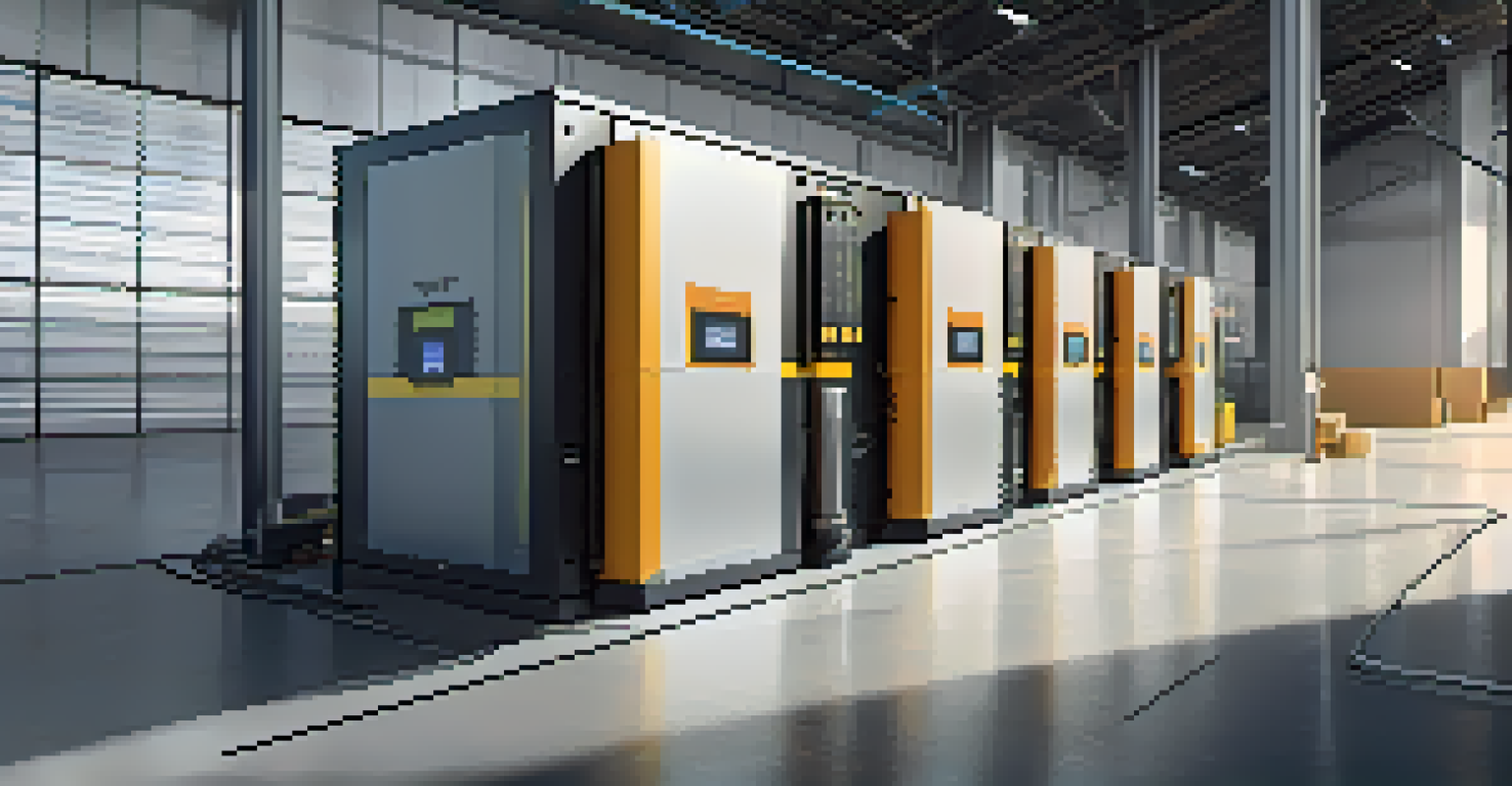Renewable Energy in Supply Chain Operations

Understanding Renewable Energy in Supply Chains
Renewable energy refers to energy derived from naturally replenished sources, such as solar, wind, and hydroelectric power. In supply chain operations, incorporating these resources can lead to significant cost savings and efficiency improvements. By reducing reliance on fossil fuels, companies can minimize their carbon footprint, making their operations more sustainable and environmentally friendly.
The use of renewable energy sources is a key strategy for companies to not only reduce their carbon footprint but also to enhance their economic resilience.
For instance, a logistics company might use electric vehicles powered by solar energy to transport goods, drastically cutting down on emissions. This transition not only helps the environment but also meets the growing consumer demand for sustainability. As more businesses recognize the importance of green practices, renewable energy is becoming a pivotal component of supply chain strategies.
Moreover, utilizing renewable energy can enhance supply chain resilience. For example, companies that invest in solar panels can generate their own power, reducing their vulnerability to energy price fluctuations and supply disruptions. This independence allows businesses to operate more smoothly and predictably, even during crises.
Benefits of Renewable Energy in Supply Chain Operations
Adopting renewable energy can lead to numerous benefits for supply chains, such as reduced operational costs. By shifting to energy sources like wind or solar, companies often see lower energy bills over time, which can significantly impact their overall expenses. This cost reduction can be reinvested into other areas of the business, enhancing growth and innovation.

In addition to cost savings, utilizing renewable energy can bolster a company's brand image. As consumers become more environmentally conscious, businesses that prioritize sustainability are often viewed more favorably. For instance, brands like Patagonia have built strong customer loyalty by committing to renewable practices, showing that eco-friendly operations can also drive sales.
Renewable Energy Reduces Costs
Shifting to renewable energy sources can lead to significant cost savings in supply chain operations.
Furthermore, renewable energy can improve regulatory compliance. As governments worldwide implement stricter environmental regulations, companies that have already embraced clean energy can stay ahead of compliance issues, avoiding fines and promoting a positive public image. This proactive stance can ultimately lead to a competitive advantage in the marketplace.
Challenges of Integrating Renewable Energy
While the benefits of renewable energy are substantial, integrating it into supply chain operations is not without challenges. One of the biggest hurdles is the initial investment required for infrastructure changes, such as installing solar panels or wind turbines. Companies may hesitate to make these upfront costs without a clear understanding of the long-term financial benefits.
Sustainability is no longer about doing less harm. It's about doing more good.
Another challenge lies in the variability of renewable energy sources. Unlike traditional energy, which provides a consistent supply, sources like solar and wind can fluctuate based on weather conditions. To mitigate this, companies must invest in energy storage solutions or hybrid systems, which can add complexity and costs to their operations.
Lastly, there is often a knowledge gap when it comes to implementing renewable technologies. Many businesses may not have the expertise needed to transition effectively, leading to potential missteps. Partnering with specialists in renewable energy can help navigate these challenges, ensuring a smoother integration into supply chain practices.
Case Studies: Companies Leading the Way
Several companies are making waves in the supply chain sector by successfully integrating renewable energy. For example, Walmart has committed to achieving 100% renewable energy across its global operations by 2035. By investing in solar and wind energy, the retail giant aims to reduce greenhouse gas emissions and promote sustainability throughout its supply chain.
Another notable example is Unilever, which has transformed its logistics operations by utilizing renewable energy sources. The company has installed solar panels at many of its facilities, resulting in significant energy savings and a reduced carbon footprint. This commitment to sustainability not only benefits the environment but also enhances the company's reputation.
Sustainability Enhances Brand Image
Embracing renewable energy not only benefits the environment but also boosts a company's reputation among eco-conscious consumers.
These case studies illustrate that embracing renewable energy can lead to tangible improvements in efficiency and sustainability. By following in the footsteps of these industry leaders, other companies can also reap the rewards of a greener supply chain.
Renewable Energy Technologies for Supply Chains
There are various renewable energy technologies available that can be applied to supply chain operations. Solar power, for instance, is a popular choice for companies looking to reduce energy costs. By installing solar panels on warehouses or distribution centers, businesses can generate their own electricity, making their operations more self-sufficient.
Wind energy is another viable option, especially for companies located in areas with strong and consistent winds. Wind turbines can be installed on-site or purchased from local wind farms, providing a sustainable energy source that can power logistics operations. This technology not only helps reduce reliance on fossil fuels but also supports local economies.
Additionally, battery storage technologies are crucial for overcoming the intermittency of renewable energy. These systems store excess energy generated during peak production times, allowing companies to draw on this stored energy when demand is high. This flexibility can significantly enhance the reliability of renewable energy in supply chain operations.
Future Trends in Renewable Energy and Supply Chains
The future of renewable energy in supply chains is promising, with several trends shaping the landscape. One emerging trend is the increasing adoption of microgrids, which allow companies to generate and manage their own renewable energy. This decentralized approach provides greater control over energy resources and enhances resilience against disruptions.
Another trend is the rising importance of transparency and traceability in supply chains. Consumers are demanding to know where their products come from and how they are made. As a result, companies are utilizing renewable energy as a selling point, showcasing their commitment to sustainability to attract environmentally-conscious consumers.
Challenges of Integration Persist
Despite the benefits, integrating renewable energy into supply chains poses challenges such as initial investment costs and variability in energy supply.
Lastly, advancements in technology are making renewable energy more accessible and efficient. Innovations in solar panel efficiency, energy storage solutions, and smart grid technology are paving the way for broader adoption. As these technologies continue to evolve, supply chains will increasingly rely on renewable energy to drive efficiency and sustainability.
Steps for Implementing Renewable Energy in Supply Chains
Implementing renewable energy in supply chains requires careful planning and execution. The first step is conducting an energy audit to assess current energy consumption and identify areas for improvement. This audit helps companies understand their energy needs and determine which renewable sources are most suitable for their operations.
Next, businesses should set clear goals for renewable energy adoption. This could include targets for reducing carbon emissions, increasing the percentage of energy sourced from renewables, or achieving specific cost savings. Having well-defined goals provides a roadmap for implementation and helps measure success over time.

Finally, collaborating with experts in renewable energy can facilitate a smoother transition. These professionals can provide insights into the best technologies to adopt, help navigate regulatory requirements, and ensure that the implementation process aligns with the company's overall sustainability strategy. By taking these steps, companies can effectively integrate renewable energy into their supply chain operations.